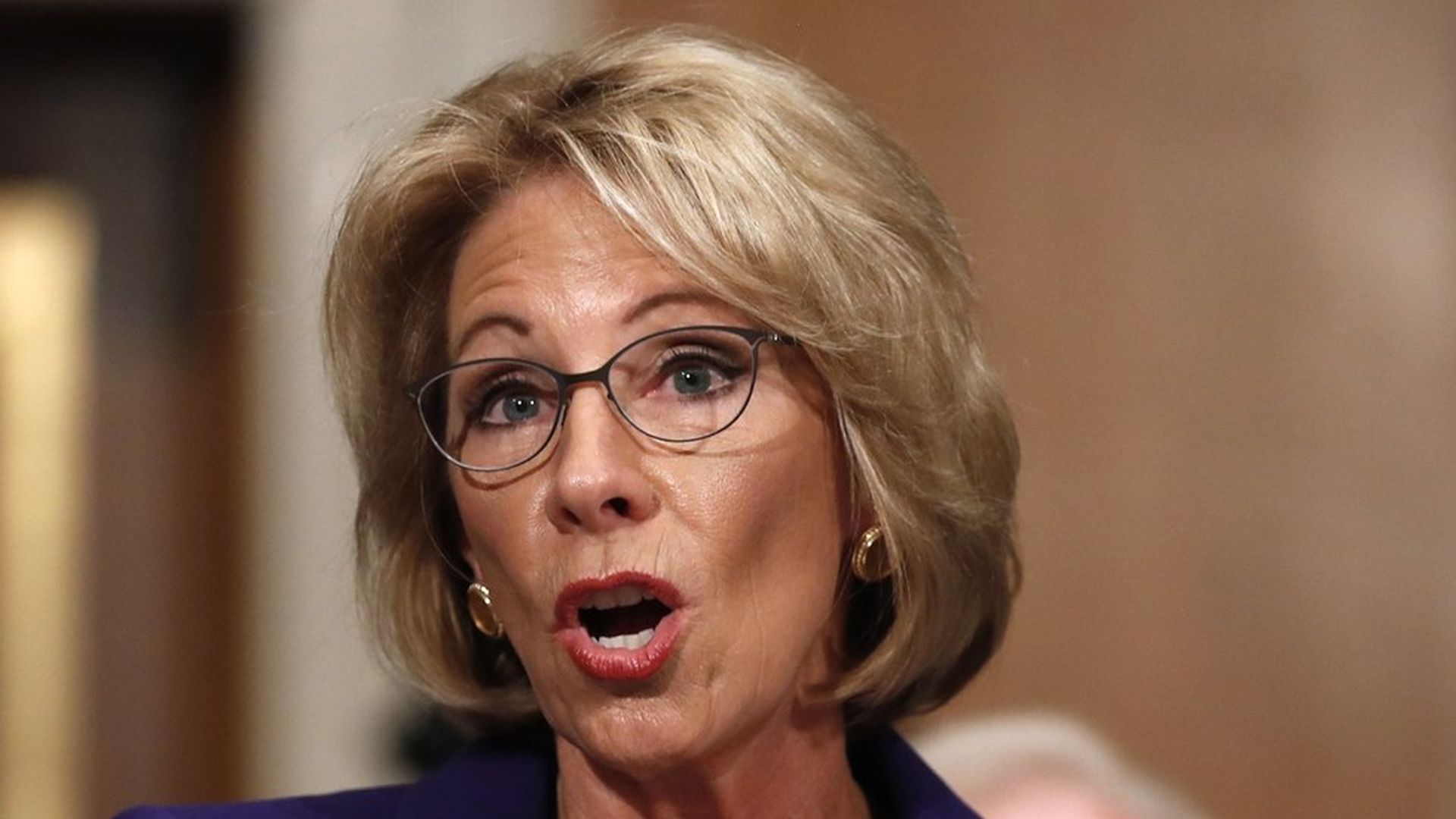What Betsy DeVos wishes she said at her confirmation hearing
Add Axios as your preferred source to
see more of our stories on Google.

AP Photo/Carolyn Kaster, File
Betsy DeVos, the new education secretary, had a brutal confirmation. She struggled in her hearing, and in short order became a late night punchline, a lightning rod for progressive protesters, and ultimately got confirmed when Mike Pence became the first vice president in history to cast a tiebreaker vote in the Senate for a cabinet nominee.
A week into the job, DeVos still hasn't watched the tape of her confirmation hearing. She says she wouldn't change much because Democrats were trying to get her to commit to things like equal accountability for all schools that receive federal funding — a concept with which she'll never agree.
There's a couple of things, though, she wishes she said differently.
What she said: Responding to a question of whether she believes guns should be allowed in schools, DeVos referred to a Wyoming school and said "there's probably a gun in the school to protect from potential grizzlies."
What she wishes she said: "It was a valid illustration," she says now. "It just probably wasn't the best illustration I could have given."
What she said: Tim Kaine asked her whether all K-12 schools receiving federal funding should be required to meet the requirements of the Individuals with Disabilities Education Act. DeVos replied: "I think that is a matter that's best left to the states," and that, after Kaine pressed further, that it was "certainly worth discussion."
What she wishes she said: "Absolutely. Absolutely ... I have so much compassion for families who have to avail themselves of that law."
Other highlights from our interview with DeVos:
- On the job: DeVos says she had never given a moment's thought to the job of Education secretary. "It was the day after the election that somebody with whom I've worked for a number of years actually e‑mailed and said, 'Would you ever think about Secretary of Education?' She didn't respond to the email for a day, but after talking to her husband, Dick, she replied: "I literally have never given it a thought, but if the opportunity ever presented itself, how could I not consider it?"
- On her interactions with Trump: She got enthusiastic about the job when she realized Trump's views on education policy were "very aligned" on both school choice and higher education. She and Trump believe many students aren't well served by four-year college degrees, and they want to promote vocational training as a means of preparing them for work and reducing student debt.
- On measuring success: DeVos says first measurement of success for the department will be a successful implementation of the Every Student Succeeds Act, which reduces the federal government's role in education. She says it's too early to have numerical goals.
- On the federal education budget: "There's clearly an opportunity to slim down the department in some ways. I don't know if that will ultimately significantly reduce the overall expenditure, but it may, it may help incentivize states in other ways."
- On changes in schools during her tenure: "I expect there will be more public charter schools. I expect there will be more private schools. I expect there will be more virtual schools. I expect there will be more schools of any kind that haven't even been invented yet."
In her ideal world, the federal government has any a role in education?
It would be fine with me to have myself worked out of a job, but I'm not sure that — I'm not sure that there will be a champion movement in Congress to do that.
She said that a lot of people are asking that question but that she hasn't reached a conclusion. "I think in some of the areas around protecting students and ensuring safe environments for them, there is a role to play ... I mean, when we had segregated schools and when we had a time when, you know, girls weren't allowed to have the same kind of sports teams — I mean, there have been important inflection points for the federal government to get involved." But are there any remaining issues like that where the federal government should intervene? "I can't think of any now," she replied.
